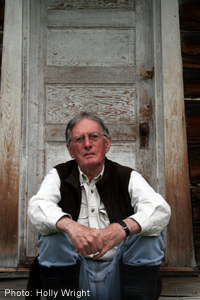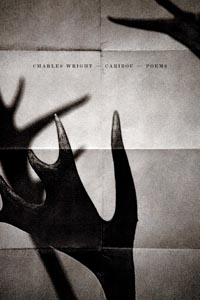Metaphysician of Daily Life
Former U.S. Poet Laureate Charles Wright will speak at ETSU
After winning the Pulitzer Prize for his 1997 collection, Black Zodiac, poet Charles Wright commented on his discomfort with the limelight: “Well, one wants one’s work to be paid attention to,” he said, “but I hate personal attention. I just want everybody to read the poems.”
 That attitude of modesty and quiet dedication to his work has marked a long, distinguished career during which Wright has won virtually every major American poetry prize, and it explains why he has only now, at age seventy-eight, accepted the very public post of U.S. Poet Laureate. He told PBS NewsHour he regretted shying away from the job when it was offered earlier and decided to accept this year because “if I’m ever going to do it, this is the time to do it.”
That attitude of modesty and quiet dedication to his work has marked a long, distinguished career during which Wright has won virtually every major American poetry prize, and it explains why he has only now, at age seventy-eight, accepted the very public post of U.S. Poet Laureate. He told PBS NewsHour he regretted shying away from the job when it was offered earlier and decided to accept this year because “if I’m ever going to do it, this is the time to do it.”
Wright was born in 1935 in Pickwick Dam, Tennessee, and spent his childhood in East Tennessee and North Carolina. His father was a civil engineer employed by the Tennessee Valley Authority, and the family moved around to various TVA dam sites during Wright’s early years. They spent most of World War II living in Oak Ridge, where the senior Wright worked for the Manhattan Project. After graduating from Davidson College in 1957, Wright joined the Army and was stationed in Verona, Italy. It was only then that he became seriously interested in poetry, inspired by the work of Ezra Pound. Once he discovered his vocation, he never strayed from it. After leaving the service, he entered the Iowa Writers’ Workshop, where Donald Justice became a mentor and Mark Strand was among his fellow students. Wright went on to further study in Italy before returning to the U.S. to teach and pursue a prolific writing career.
His fifth collection, The Southern Cross, was a finalist for the 1982 Pulitzer Prize, and Country Music: Selected Early Poems won the National Book Award for Poetry the following year. Wright has been regarded as leading figure in American poetry ever since, winning consistent critical praise for his steadily growing body of work, as well as a devoted readership. Caribou, his twenty-fourth book of poems, was published in March of this year. Although Wright’s poetry has evolved formally over time, its central concerns have remained much the same: the spiritual response to the natural world, the human yearning for some kind of transcendence or revelation, and the inexorable power of time: he once said that “the clock is what we all write about.”
Wright’s work is both accessible and deeply philosophical. “All my poems basically are about the metaphysics of the quotidian, the daily life,” he has said. He is particularly inspired by encounters with the natural world, and the Tang dynasty poets of China are among his acknowledged influences, especially for “their use of landscape as spiritual background and backdrop.” Again and again in Wright’s poems, nature is a gateway to the eternal, inevitable, or ineffable. Consider “Still Life with Spring and Time to Burn,” which begins:
 Warm day, early March. The buds preen, bursting their shirtwaists
Warm day, early March. The buds preen, bursting their shirtwaists
All over the plum trees. Blue moan of the mourning dove.
It’s that time again,
time of relief, time of sorrow
The earth is afflicted by.
We feel it ourselves, a bright uncertainty of what’s to come.
The poem becomes a meditation on time and death:
And love will kill us—
Love, and the winds from under the earth
that grind us to grain-out.
Because of his Tennessee and North Carolina roots, Wright is usually designated a Southern writer, but it’s not a label he’s entirely comfortable with. While his deep attachment to Appalachia is undeniable, his sensibility and focus set him somewhat apart from other Southern poets. As he told Daniel Cross Turner in a 2005 StorySouth interview, “Most other Southern poets are much more interested in the history of the place, or the history in place. I am more interested in it as I look at it, as I see it. … The Southern narrative tradition looks at landscape as history, a door into the dark, as it were. I tend to look at landscape as revelation, a door into the light.”
Wright retired from teaching in 2011, after twenty-eight years at the University of Virginia, and he recently told UVA Today that he misses interacting with students. Amy Wright (no relation), who now teaches creative writing at Austin Peay State University in Clarksville, studied with Wright as an undergraduate and remembers him as an inspiring and encouraging teacher. “He prompted me to write poems I wasn’t capable of yet,” she says, “which many a great teacher can do—but few can raise the bar for you while you’re midair in such a way that you feel like you’re accomplishing something with failed vaults. He made me feel brave for seeing what I aspired to.”
Since his retirement, Wright has continued to divide his time between Charlottesville and the remote cabin in Montana that has served as his summer writing refuge for many years. He and his wife reportedly plan to spend this summer there, as usual, before Wright assumes the post of Poet Laureate in the fall. In spite of his distaste for notoriety, he seems to be looking forward to the job. As he told the NewsHour, “I am prepared for what they want me to do. I wouldn’t have taken it on otherwise. And once I get on the stage, I’m okay. It’s just that I get anxious about getting on the stage and being a public person. But I’m dynamite once I get up there.”
[The review essay ran originally on June 20, 2014. It has been updated with new event details. To read “Tennessee Line” by Charles Wright, click here.]

Maria Browning is a fifth-generation Tennessean who grew up in Erin and Nashville. A graduate of Mount Holyoke College, she has attended the Clothesline School of Writing in Chicago, the Moss Workshop with Richard Bausch at the University of Memphis, and the Sewanee Writers’ Conference. She lives in White Bluff.


